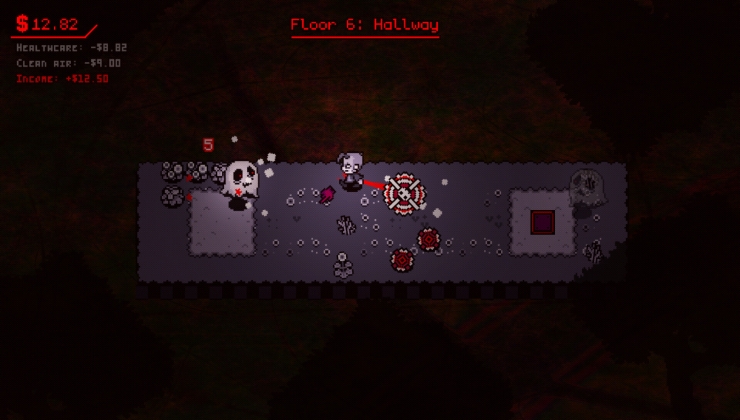With an idea to help get beginner coders interested in FOSS, and to help improve coding skills, the GNOME Foundation has teamed up with Endless for a Community Engagement Challenge.
Not gaming news but anything that helps Linux and the FOSS community is important, everything we do is on Linux and expanding the FOSS community is vitally important. Games are built with code obviously, so it's a good fit to mention!
The Community Engagement Challenge is going to run through multiple stages, with the first opening on April 9 for anyone to send in their submissions if you (or your team) think you have a good idea for a project that will engage beginning coders with the free and open-source software ("FOSS") community. You will then have until July 1 to submit a written proposal for your concept. From there, they will pick twenty entries that will move to the next round and each will be given $1,000 each. The next phase requires a proof of concept, with four projects moving into receiving $5,000 to then go into the final round. The last round requires a delivered product with the winner receiving $15,000 and the second place finisher receiving $10,000.
From the press release we got sent:
“Through the Challenge we hope to reach a diverse audience, to encourage beginning coders to get involved with the FOSS community to help ensure that free software is available long into the future,” said Neil McGovern, GNOME Foundation Executive Director. “What better way to do that than to reach out to the community itself to come up with creative ways to inspire the next generation?”
“Our mission at Endless has evolved initially from working with underserved populations in emerging markets and giving them access to important computing tools,” said Matt Dalio, Founder, Endless. “It has now become important to us to help the youth of today shape their technology, rather than be shaped by it. This initiative with The GNOME Foundation is the perfect partnership to further our mission.”
What's interesting is that your project can take on pretty much any form be it a video, a game, software, educational material and so on. As long as it's a good idea and will help people learn to code and stick around in the FOSS community, you can submit it.
The winner will be announced in Spring 2021.
If you're interested and want to know more, head over to the official GNOME Challenge website.
How well does this entry engage with communities and groups under-represented (e.g, women, non-binary, gender queer, or gender non-conforming) in the FOSS Community?
smh
How well does this entry engage with communities and groups under-represented (e.g, women, non-binary, gender queer, or gender non-conforming) in the FOSS Community?
smh
Why? It's one of three "secondary considerations".
How well does this entry engage with communities and groups under-represented (e.g, women, non-binary, gender queer, or gender non-conforming) in the FOSS Community?
smh
Why? It's one of three "secondary considerations".
Because it even is a consideration.
Last I checked I did neither need my genitals nor my sexuality to program. This is a politically motivated power grab and only brings division and drama, not better code. Equality starts when you do not differentiate. Now they have to ask for gender and divide the projects into those categories.
But the fact it's under secondary gives me a bit of hope this cancer will soon die off.
Because it even is a consideration.FOSS projects survive based on the number of motivated and talented developers available. Women represent about 50% of the population but are under-represented in software development. And you believe there is no reason to even wonder why that might be the case or attempt to leverage a new demographic in order to increase the size of the developer pool?
Last I checked I did neither need my genitals nor my sexuality to program. This is a politically motivated power grab and only brings division and drama, not better code. Equality starts when you do not differentiate. Now they have to ask for gender and divide the projects into those categories.
But the fact it's under secondary gives me a bit of hope this cancer will soon die off.
Also, not in a single part of that text you quoted, nor in the context of that quote, is there a demand to "ask for gender". They are showing an interest in entries that engage under-represented communities but if you read the actual text it's not even a strict requirement.
As for division and drama, I rarely hear about Outreachy participants causing drama and division. People in article comments about Outreachy and the like on the other hand...
Bloody anti-anti-sexism snowflakes. Waah, waah, waah.How well does this entry engage with communities and groups under-represented (e.g, women, non-binary, gender queer, or gender non-conforming) in the FOSS Community?
smh
Why? It's one of three "secondary considerations".
Because it even is a consideration.
Last I checked I did neither need my genitals nor my sexuality to program. This is a politically motivated power grab and only brings division and drama, not better code. Equality starts when you do not differentiate. Now they have to ask for gender and divide the projects into those categories.
But the fact it's under secondary gives me a bit of hope this cancer will soon die off.
Their desktop environment doesn't mesh with my personal tastes, but that doesn't mean I have to be against them; one of the nice things about open source is good people can pursue different approaches and you can get different good results.
Residents of Brazil and Italy are excluded due to local laws restricting contests.Wonder what is this all about?
From the [FAQ](https://www.gnome.org/challenge/faq/):
Residents of Brazil and Italy are excluded due to local laws restricting contests.Wonder what is this all about?
Bolsonaro and for Italy i can only speculate, but i'll go with is SARS' fault.
Women represent about 50% of the population but are under-represented in software development.
BS, as always. Change under-represented for NOT interested, which right now is also a lie, and we can meet in the middle.
Wait, so, you think that 50% of software developers are women? Or that 50% of GNOME community members are women? Literally don't understand your stance but I'm going to assume it's not correct either way. No need for me to meet you in the middle.Women represent about 50% of the population but are under-represented in software development.
BS, as always. Change under-represented for NOT interested, which right now is also a lie, and we can meet in the middle.
If you're trying to argue that women aren't interested, you have a very tiny world view. There's reasons why special groups exist, to bring more women (and other groups) into software development because it's historically been VERY male centered and quite hostile. It's a really bad take.Women represent about 50% of the population but are under-represented in software development.
BS, as always. Change under-represented for NOT interested, which right now is also a lie, and we can meet in the middle.
That's not something that needs debating either, stop it, you look stupid. That's to you and anyone else choosing to focus on such stupidness.
Last edited by Liam Dawe on 8 Apr 2020 at 9:24 pm UTC
How well does this entry engage with communities and groups under-represented (e.g, women, non-binary, gender queer, or gender non-conforming) in the FOSS Community?
smh
Why? It's one of three "secondary considerations".
Because it even is a consideration.
Last I checked I did neither need my genitals nor my sexuality to program. This is a politically motivated power grab and only brings division and drama, not better code. Equality starts when you do not differentiate. Now they have to ask for gender and divide the projects into those categories.
But the fact it's under secondary gives me a bit of hope this cancer will soon die off.
In addition what other commenters have already said, different kind of people will bring different ideas to FOSS projects. This kind of diversity will make open source more democratic and better.
Basically they:
- Monitor diversity levels across the organisation at the skill set level (e.g. java developers)
- When they need to hire someone new, they take into account the diversity level figures.
- They identify they need a specific gender to level it out, and go with that (e.g. female java developer)
The cool thing is they have a team that actually writes the job post differently. Their research indicates that certain kinds of wording actually appeals to genders differently, so they can essentially have a large pool of interested parties in their job postings with the targeted gender. So if they want a female, they actually use slightly different wording in the job description, which in turn actually attracts more women to the job ad (they said that certain "power" words resonate and attract the types of gender they are after).
The outcome is not only do they have gender equality, but they also have excellent quality due to not "watering down" the barrier of entry for the sake of equality.
Why we need to actively increase equality is because there are many systemic factors that counteract equality. E.g. many things in our culture. So even if you as an employer never discriminate you won't get diversity of perspectives (which enriches your project and society as a whole) through passive means alone.
I think the active monitoring and targeted ads mentioned by @holisticboy are a nice maneuver. People who are against active diversification find this more measured (and costly) approach more palatable, I would guess. It makes sense that targeted ads would work to a certain degree - if I'm going to hear an ad that sounds like an invitation to a college boys-only club, then I would from past experiences and associations realize that I would have a bad time there without even thinking about it.










 How to set, change and reset your SteamOS / Steam Deck desktop sudo password
How to set, change and reset your SteamOS / Steam Deck desktop sudo password How to set up Decky Loader on Steam Deck / SteamOS for easy plugins
How to set up Decky Loader on Steam Deck / SteamOS for easy plugins
See more from me